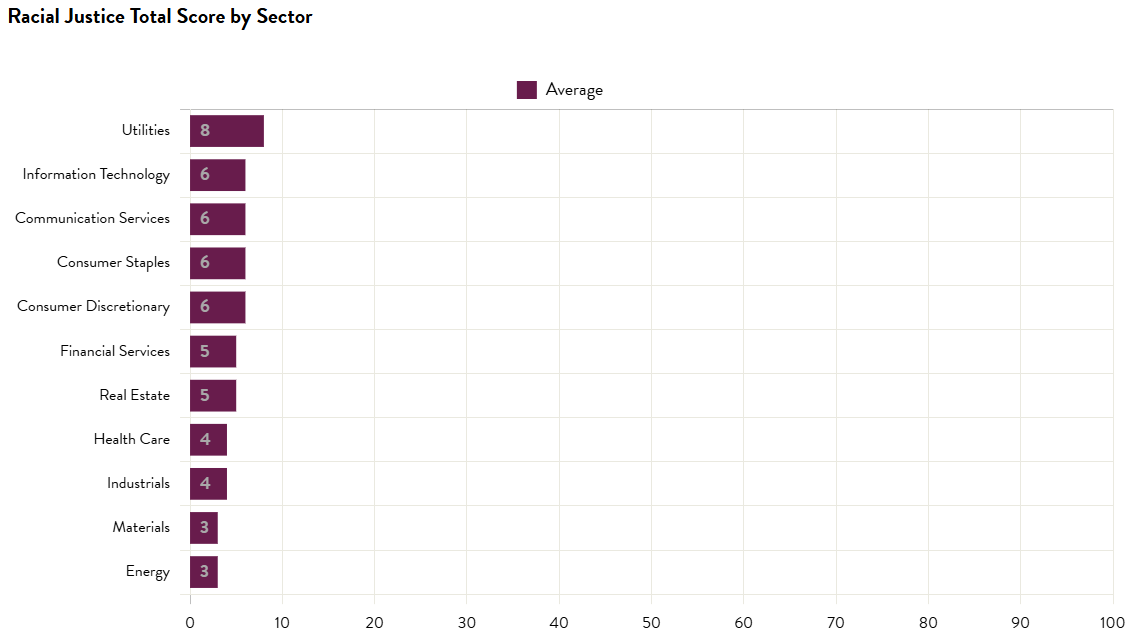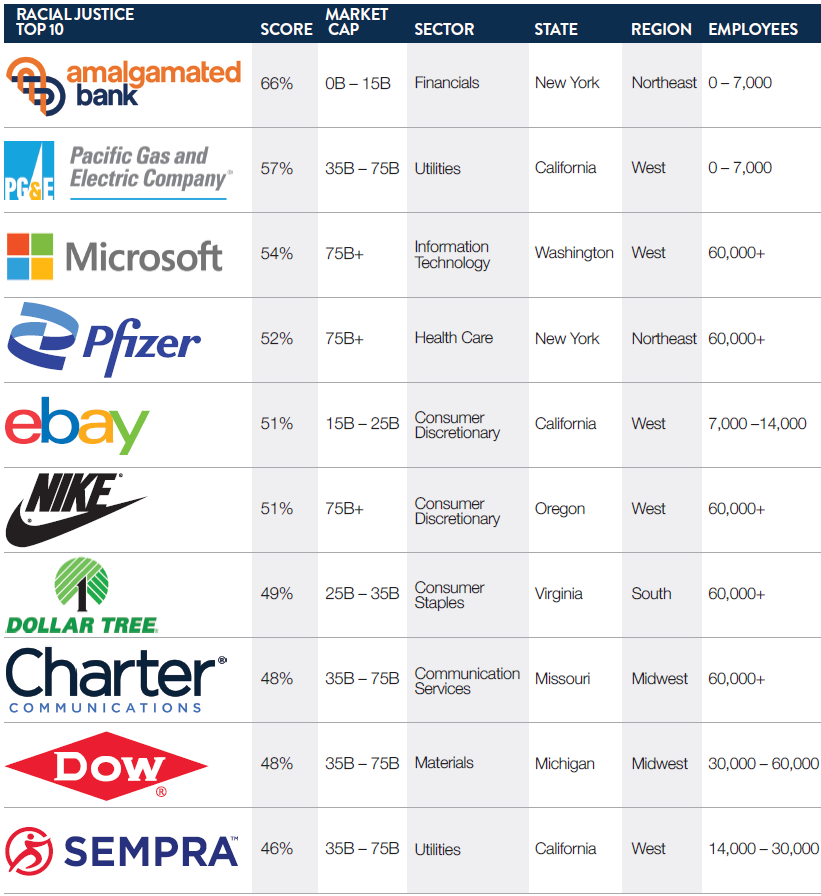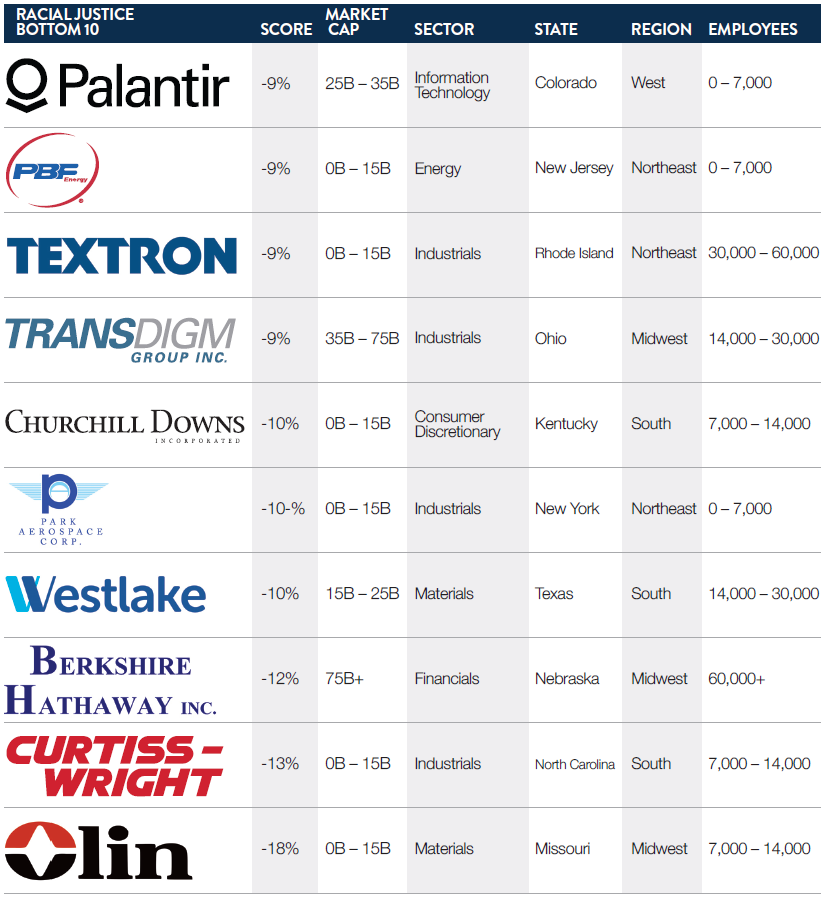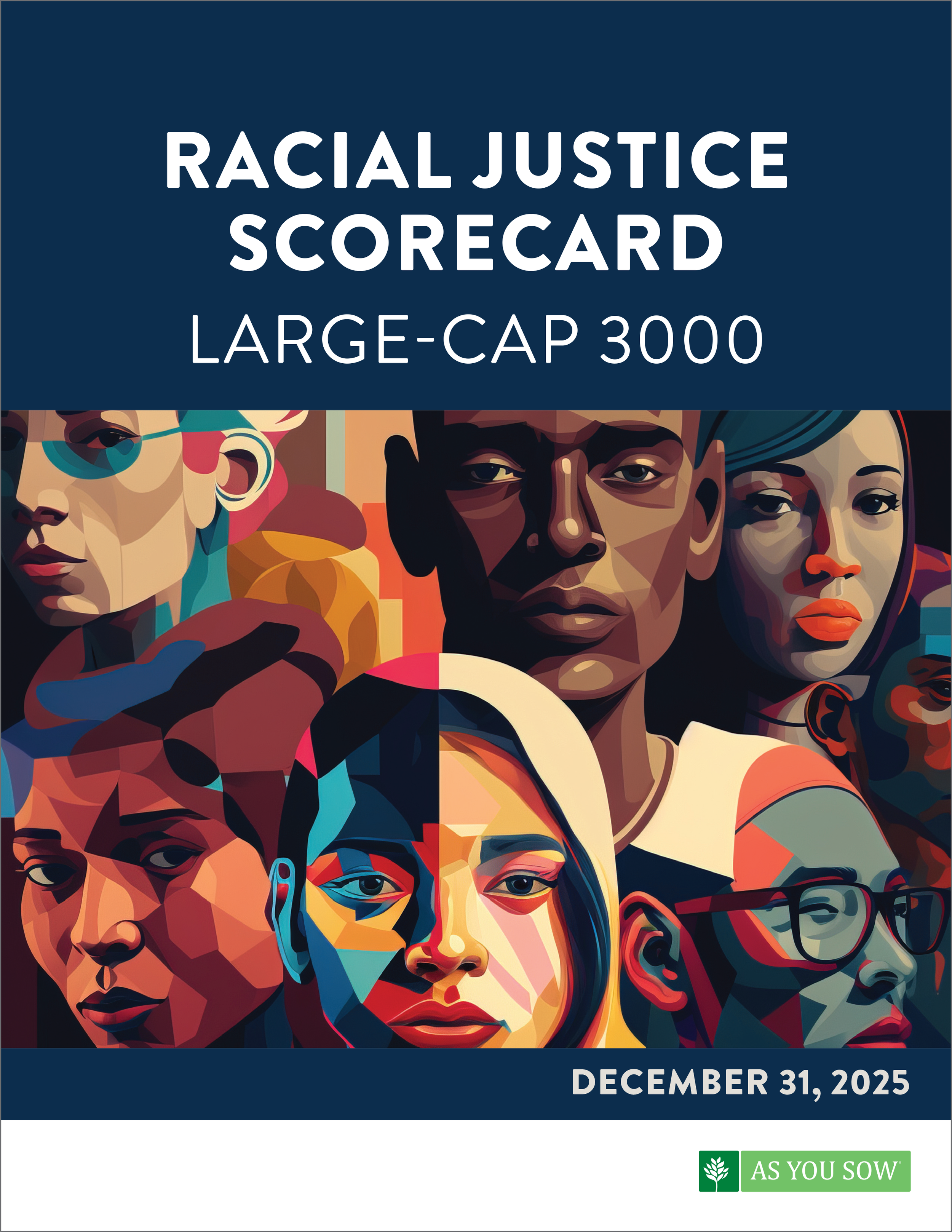racial justice report
The Racial Justice Initiative educates companies on the importance of incorporating standards related to racial justice, diversity, equity, and inclusion, and environmental justice. By showing the material benefit of cultivating a diverse workforce, with strong equity-based policies and practices, we help companies further positive actions for their employees, communities, shareholders, and consumers.
The Racial Justice Scorecards on the Large-Cap 3000 track publicly available information on key actions related to racial equity; diversity, equity, and inclusion (DEI) disclosure and policies; and environmental justice. We update our data quarterly, giving companies we engage with the opportunity to improve throughout the year. We conduct annual comprehensive research on the full 3000 companies once a year. During this time, we engage with companies and stakeholders to understand and gauge corporate progress on racial equity.
The Racial Justice Initiative directly engages public companies on their racial equity and DEI policies and practices. We use the Racial Justice Scorecards as the backbone of our corporate engagement strategy and use our key performance indicators (KPIs) as evaluation guidelines to track and monitor corporate progress. Our Racial Justice Scorecards have been used to create standards for investors, companies, and stakeholders to act responsibly in favor of justice and racial equity.
METHODOLOGY, SCORING, AND KEY PERFORMANCE INDICATORS
In collaboration with our Racial Justice Advisory Committee, organizational allies, and other stakeholders, 27 key performance indicators were established to measure companies’ progress on racial equity and environmental justice, creating individual corporate scorecards. As You Sow’s Racial Justice Research Team examines corporate websites and reports, corporate social media accounts, and credible primary, secondary, and tertiary sources for material information on each company in the Large-Cap 3000 to determine the level of action, or inaction, on racial equity, diversity, equity and inclusion, and environmental and climate justice. Our environmental justice research focuses on a multidisciplinary approach by pulling information from a variety of sources to build a profile of corporate environmental commitments and activities. The Racial Justice Initiative worked closely with environmental justice issue experts to develop KPIs which monitor corporate progress in an environmental justice framework. Research and data for six of the Workforce Disclosure KPIs are taken directly from our partner initiative at As You Sow, Workplace Equity. The remainder of our Racial Justice KPIs are researched and scored by the Racial Justice Initiative and subjected to an intensive, multi-level, quality assurance process. The scoring of each KPI is described in the Racial Justice Scorecard Report, please note that there is no additional weighting to our current KPIs and that the companies’ scores show the true valuation of their actions.
As You Sow releases quarterly updates to the Racial Justice Scorecard, as well as one large-scale annual update. It is possible that a company may have increases or decreases to their scores that are not represented in real-time. To inform us of corporate reporting not captured, please send an inquiry to [email protected]. To learn more about the Racial Justice Initiative’s corporate engagement on racial and environmental justice please visit our webpage.
RACIAL JUSTICE SCORECARDS: QUARTERLY UPDATE KEY FINDINGS
During 2025’s research, no clear indication has been found that companies have stopped the usage of the term “ESG” on their website or as part of their reporting. However, many companies no longer label their annual ESG data disclosure “ESG Report” but instead opt for – often colorful – alternatives: Do More Good Report, Sail and Sustain Report, Stewardship Report, Health for Humanity Report, Responsible Business Practices Report, Snacking Made Right Report, Comfort Report, to mention a few.
Despite the recent discussions around DEI, the percentage of companies in the Large-Cap 3000 with initiatives, programs, and policies that would typically fall under the purview of a DEI department has remained at around 65%.
Nearly a third of the Large-Cap 3000 companies have some kind of Employee Resource Group (also referred to as Affinity/ Business/ Colleague/ Resource Group or Network) for BIPOC employees. However, some companies which previously mentioned each of their ERGs by name, now only mention the overall number of groups, without disclosing their actual composition.
Over a third of companies in the Large-Cap 3000 require or offer some form of DEI training – either for all employees or at least for a certain group of employees– with the majority of companies simply calling it “anti-discrimination” training, while others emphasize “diversity”, “inclusion”, or “unconscious bias”.
“DEI” is being rebranded as “Employee Engagement”, “Culture”, Talent Acquisition” and “Belonging”. DEI leaders hired in late 2020 and 2021 were predominantly in executive positions. We have seen a gradual decline since, with 277 companies having a C-Suite employee as their DEI leader in March 2024 compared to 175 companies in March 2025, 164 in November 2025, and 159 in January 2026.
Only 30 companies have conducted a Racial Equity/Civil Rights audit and/or released their findings.
Only 99 of the Large-Cap 3000 companies state that they support, or partner with, local and/or national civil rights organizations as a form of community engagement and outreach.
Only 69 of the Large-Cap 3000 companies publicly recognized, or have made public statements, regarding environmental and/ or climate justice in relation to their business practices.
Only four companies, Chevron Corp., Lowe’s Companies Inc., The Home Depot Inc., and United Parcel Services Inc., have more than 100 environmental violations each since 2020.
Only one company, McDonald’s, received the lowest possible score for having disproportionate effects on BIPOC communities.
Of the Large-Cap 3000 companies, 160companies have a total score that is less than zero, meaning that they do more harm to communities of color than they make up for with positive policies and practices. The majority of these low-scoring companies are in the Industrials sector.
LEADERS: TOP 10
LAGGARDS: BOTTOM 10
KEY PERFORMANCE INDICATORS AND SCORING RUBRIC
| PILLAR | KEY PERFORMANCE INDICATOR | SCORING RUBRIC | |
|---|---|---|---|
| Corporate Responsibility | 1 | Equal AI Membership | 0 or 1 |
| Corporate Responsibility | 2 | CEO Responsibility | 0 or 1 |
| Corporate Responsibility | 3 | Third Party Racial Equity/Civil Rights Audit | 0, 3, 5 |
| Internal DEI Policies/Programs | 4 | ERGs for BIPOC Employees | 0 or 1 |
| Internal DEI Policies/Programs | 5 | DEI Training for Employees | 0, 3, 5 |
| Internal DEI Policies/Programs | 6 | Internal DEI Department | 0 or 1 |
| Internal DEI Policies/Programs | 7 | DEI Leader Title | 0, 1, 2, 3, 4, 5 |
| Internal DEI Policies/Programs | 8 | Supply Chain Diversification | 0, 3, 5 |
| Internal DEI Policies/Programs | 9 | Anti-Prison Labor Policies | 0 or 1 |
| Internal DEI Policies/Programs | 10 | Fair Chance Hiring Policies | 0 or 1 |
| Workforce Data Disclosure | 11 | Workforce Composition | 0 or 1 |
| Workforce Data Disclosure | 12 | Pay Equity | 0, 1, 2 |
| Workforce Data Disclosure | 13 | Promotion Rates | 0, 1, 2, 3, 4, 5, 6, 7 |
| Workforce Data Disclosure | 14 | Hiring Rates | 0, 1, 2, 3, 4, 5, 6, 7 |
| Workforce Data Disclosure | 15 | Retention Rates | 0, 1, 2, 3, 4, 5, 6, 7 |
| Workforce Data Disclosure | 16 | EEO-1 Data Released | 0 or 1 |
| External Actions | 17 | Provides Products/Services as BIPOC Community Engagement | 0 or 1 |
| External Actions | 18 | Financial Donations to Racial Justice | 0 or 1 |
| External Actions | 19 | BIPOC Recruitment | 0 or 1 |
| External Actions | 20 | Supporter/Partner of HBCUs, HSIs, Etc. | 0 or 1 |
| External Actions | 21 | Supporter/Partner of Civil Rights Organizations | 0, 3, 5 |
| External Actions | 22 | Human Rights Violation due to Systemic Racism | 0 or -5 |
| Environmental Justice | 23 | Acknowledgement of Environmental/Climate Justice | 0 or 1 |
| Environmental Justice | 24 | Abides by Environmental Regulations (Five-Year History) | 0, -1, -2, -3, -4, -5 |
| Environmental Justice | 25 | Environmental Fines and Penalties (Five-Year History) | 0, -1, -2, -3, -4, -5, -6 |
| Environmental Justice | 26 | Adverse Effects to BIPOC Communities (Five-Year History) | 0, -1, -2, -3, -4, -5 |
| Environmental Justice | 27 | Supporter/Partner of Environmental/Climate Justice Groups | 0, 3, 5 |





